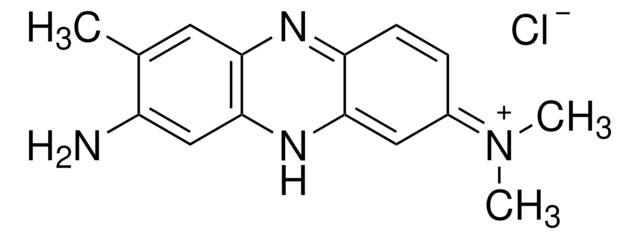1.01369
Neutral red (C.I. 50040)
pH indicator and for microbiology
Synonym(s):
Neutral red (C.I. 50040)
About This Item
Recommended Products
product name
Neutral red (C.I. 50040), indicator and for microbiology
Quality Level
form
solid
composition
dye content, ≥75% spectrophotometric assay
loss
≤18% loss on drying, 110°C
pH
3.1 (20 °C, 10 g/L in H2O)
solubility
50 g/L
bulk density
350‑500 kg/m3
Amax
452-455 nm (buffer pH 8.0)
514-519 nm (buffer pH 6.8)
λmax
540-543 nm at 50% in ethanol
storage temp.
2-30°C
InChI
1S/C15H16N4.ClH/c1-9-6-13-15(8-11(9)16)18-14-7-10(19(2)3)4-5-12(14)17-13;/h4-8H,16H2,1-3H3;1H
InChI key
PGSADBUBUOPOJS-UHFFFAOYSA-N
Related Categories
Application
- Smartphone-based sensing and in vivo and in vitro imaging of Mn(VII) based on nitrogen-doped red fluorescent carbon dots.: Li et al. present a novel smartphone-based sensor system utilizing nitrogen-doped red fluorescent carbon dots for detecting Mn(VII) ions. The study leverages the red fluorescence properties of these carbon dots for in vivo and in vitro imaging, enhancing detection accuracy and application in environmental monitoring and biological imaging (Li et al., 2024).
- A "2-in-1" Bioanalytical System Based on Nanocomposite Conductive Polymers for Early Detection of Surface Water Pollution.: Kharkova et al. develop a bioanalytical system integrating nanocomposite conductive polymers to detect surface water pollution. Neutral red is used as an indicator for the electrochemical detection of pollutants, demonstrating the system′s potential for early and accurate environmental monitoring (Kharkova et al., 2024).
- Programable sewage-cleaning technology: Regenerating chitosan biofilms with anti-bacterial capacity via self-purification of water pollutants.: Wu et al. explore a programmable sewage-cleaning technology that regenerates chitosan biofilms with antibacterial properties. Neutral red plays a critical role in evaluating the biofilms′ effectiveness in self-purification processes, offering insights into sustainable wastewater management (Wu et al., 2024).
- Characteristics and adsorption behavior of typical microplastics in long-term accelerated weathering simulation.: Yu et al. examine the characteristics and adsorption behavior of microplastics under long-term weathering. Neutral red staining is employed to study the surface interactions and degradation patterns of microplastics, providing valuable data for environmental impact assessments (Yu et al., 2024).
Analysis Note
Identity (UV/VIS-Spectrum): passes test
Transition range: pH 6.8 - pH 8.0 Violet red - orange yellow
Absorption maximum λmax. (ethanol 50 %): 540 - 543 nm
Absorption maximum λ 1 (buffer pH 6.8): 514 - 519 nm
Absorption maximum λ 2 (buffer pH 8.0): 452 - 455 nm
Spec. Absorptivity A 1%/1cm (λmax; 0.005 g/l; ethanol 50 %): 1180 - 1610
Spec. Absorptivity A 1%/1cm (λ1max; 0.015 g/l; buffer pH 6.8; calc. on dried substances): 425 - 575
Spec. Absorptivity A 1%/1cm (λ2max; 0.015 g/l; buffer pH 8.0; calc. on dried substances): 395 - 535
TLC-Test: passes test
Loss on drying (110 °C): ≤ 18 %
Suitability for microbiology: passes test
Storage Class Code
11 - Combustible Solids
WGK
WGK 3
Flash Point(F)
Not applicable
Flash Point(C)
Not applicable
Certificates of Analysis (COA)
Search for Certificates of Analysis (COA) by entering the products Lot/Batch Number. Lot and Batch Numbers can be found on a product’s label following the words ‘Lot’ or ‘Batch’.
Already Own This Product?
Find documentation for the products that you have recently purchased in the Document Library.
Our team of scientists has experience in all areas of research including Life Science, Material Science, Chemical Synthesis, Chromatography, Analytical and many others.
Contact Technical Service


